Blog
Blog-posts are sorted by the tags you see below. You can filter the listing by checking/unchecking individual tags. Doubleclick or Shift-click a tag to see only its entries. For more informations see: About the Blog.
Previously on vvvv: vvvvhat happened in December 2020
First off,
there's been the 2020.2.5 release.
But now we finally also have a Release Candidate for 2021.3, the upcoming version including the shiny new 3d engine based on Stride.
Even before this one is released you're asking what's next?! How on earth could vvvv be further improved? That's what we're planning to answer in a separate blog post soon.
Until then, let's hear it from the working groups:
Working Groups
There've been a lot of updates in the last meetup. Here is the gist:
- VL.OpenCV update by ravazquez
- VL.ML update by sebescudie and Hadasi
- FUSE update by dottore and texone
- VL.Elementa update by sebescudie and dottore
- Universal Skeleton Bible update by ravazquez and dottore
- Transforming Brains announcement by ravazquez
Or just lean back and watch the whole 7th meetup in one go.
Contributions
New:
- VL.HapPlayer by lev
Updates:
- VL.Elementa by dottore and team
- VL.FMODStudio by ravazquez
- VL.Audio by vvvv
- VL.Audio.GPL by motzi
Learning material
Gallery
And more:
- Return the Eye by DROUGHT SPA
- Scriabin Piano Sonata No2 by Piano and Image duo
- conway-3d-demo
- Shaky Savine & Doing Nothing with AI
- Raresh // Live Studio Session
- ACHAT
Jobs
- Always keep an eye on the vvvv job board
- There are often some more on dasauge.de
- If you need a vvvv specialist or are one yourself, check out this listing of vvvv specialists available for hire
That was it for January. Anything to add? Please do so in the comments!
Here we go!
We have a candidate for our upcoming release:
This is going to be the first stable release including the huge shiny new 3d rendering library we created based on the Stride Engine!
For more details of what's new, please consult the Change Log.
So please test and report your findings. If we don't find any complete show-stoppers within the next days, this is going to be it!
When Tue, Jan 26th 2021 - 20:00 until Tue, Jan 26th 2021 - 22:00
Save the date!
We're meeting up on January 26th, 8pm CET to get insights into what everyone is patching on. How will this work? Something like the last time. So please invite all your vvvvriends and vvvvamily to join us!
Want to share your work?
Please do! Anything more or less related to vvvv, yourself and your projects. Share some thoughts, share your funny fails. Or just ask some questions...
No sign-up, no line-up! We'll just have this an open call that anyone can join. Surprise!
Pwd: 4444
Please use a name we can identify so we can let you in!
Any questions? Get in touch via meetup@vvvv.org. See you there!
Here is to let you all know about the existence of MediaFutures. In a nutshell:
...
MediaFutures funds and supports products, services, artworks and experiences that transform for the better the ways people consume news and engage with facts, and the ways experts make decisions and contribute to society.
...
MediaFutures will support 51 startups or SMEs and 43 artists through a total of three Open Calls in the coming three years, distributing a total amount of €2.5M. It will support the selected applicants through a 6-month acceleration (startups & SMEs)/ residency (artists) programme including funding, mentoring and training.
If you're interested, checkout the details for the 1st open call which is closing on January 28!
This info is from their FAQ regarding who is eligible in the calls:
- The Member States (MS) of the European Union (EU), including their outermost regions;
- The Overseas Countries and Territories (OCT) linked to the Member States;
- H2020 Associated countries: according to the updated list published by the EC
- The UK applicants are eligible under the conditions set by the EC for H2020 participation at the time of the deadline of the call.
Note that individual artist applicants will be eligible from any country in the world provided that they are able to travel to Europe for the MediaFutures programme and always provided that Covid-19 situation allows it.
On short notice: They have a webinar on January 13, 1pm CET to learn more about the program.
Hope some of you have an idea to apply and if your idea involves vvvv, don't hesitate to get in touch. It may be worth to explore opportunities together...
Hello everyone!
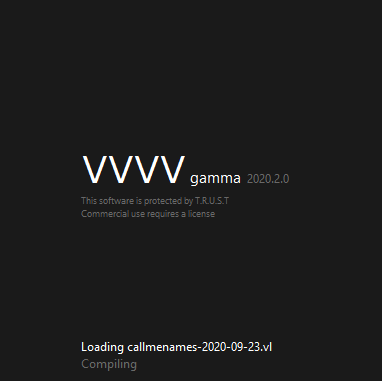
Here is the second big release this year for vvvv gamma! Available for download and purchase. Now!
It comes with improvements that strengthen the toolkit character of vvvv gamma and VL, which are outlined over here: vvvv-the-tool.
It also comes with small improvements for object-oriented programming patterns by introducing the This node. Many of those changes were motivated to be able to roll out a certain library. So this is the last version without that exact library.
Bugfix releases:
- 2020.2.2 on October 1st, 2020
- 2020.2.3 on November 17, 2020
- 2020.2.4 on November 25, 2020
- 2020.2.5 on January 8, 2021
For the full list of changes, see the The Log of Changes.
Updating libraries
This release introduces a breaking change for certain NuGet packages! If you use any of the following packages then you'll have to make sure to use the latest available version:
- VL.OpenCV
- VL.Devices.Kinect2
- VL.Devices.AzureKinect
- VL.Devices.AzureKinect.Body
- VL.Devices.Nuitrack
- VL.Devices.RealSense
- VL.MediaFoundation
- VL.Elementa -pre
- VL.Audio -pre
- VL.IO.OSC -pre
- VL.RunwayML -pre
So when updating to 2020.2.x you need to update to the latest version of these libraries. See Manage Nugets on how to do so via command-line.
Running 2020.1.x on the same machine
If, after running 2020.2.x and updating the above libraries you want to run 2020.1.x again, you'll have to make sure to first remove the new packs that are only working for 2020.2.x.
To do so, you'd go to your
AppData\Local\vvvv\gamma\nugets
and either delete packs selectively or simply clean the whole directory and re-install NuGets as you need them.
Info for library developers
This breaking change only affects your library if it is using a CSharp-project that is referencing VL.Core! In this case, all you have to do is to update VL.Core to 2020.2.x.
Then please communicate which version of your library is compatible with which version of vvvv.
Sorry for the inconvenience, we hope to make it up soon, by sharing a certain library...
Happy patching & see you soon,
yours devvvvs!
Previously on vvvv: vvvvhat happened in November 2020
So,
December happened and what not happened is the planned release of 2020.3, the first stable one including the shiny new 3d engine VL.Stride, as planned. We're in the final commits for it, so please bear with us and just get a preview if you can't wait.
Meanwhile, the promised rework of the OSC and TUIO nodes has landed in previews, which should make it the easiest ever to work with those two ubiquitous protocols.
Working Groups
I think it makes sense to start giving you an overview of a few bigger community efforts that have recently started. Please add your expertise where you see fit! Hoping we can gather some regular updates from them in the coming months:
- The FUSE project is building GPU tools and libraries to use with VL.Stride. You can support them here
- The Universal Skeleton Bible is meeting for the first time next week
- A new VL.ML chat room just opened to discuss all things vvvv and machine learning
Contributions
New:
Updates:
- VL.OpenCV meets VL.Stride by ravazquez
- VL.IO.NDI by bjoern and motzi
Learning material
- takuma started a new vvvv gamma Learn log
- tonymark uploaded episode 5 of his chinese vvvv gamma course
- All vvvv workshop recordings from NODE20
Gallery
And more:
Jobs
- Always keep an eye on the vvvv job board
- There are often some more on dasauge.de
- If you need a vvvv specialist or are one yourself, check out this listing of vvvv specialists available for hire
That was it for December. Anything to add? Please do so in the comments!
After NODE 2020, having seen all the wonderful things Stride and vvvv can do together, it was inevitable to fall head first into the adventure that has been bringing Stride and VL.OpenCV into a playful and seamless friendship.
I am happy to announce that as of version 1.2.0 of VL.OpenCV, you can effortlessly and painlessly:
Find your camera's position based on a pattern or marker
Need to know where your camera is and what it's looking at based on an Aruco marker or a chessboard calibration pattern?
Say no more:

And now from the outside:

Dizzy yet?
Estimate the pose of an Aruco marker to create AR applications
Bring 3D objects and animations into your image using Aruco markers to create augmented reality projects:
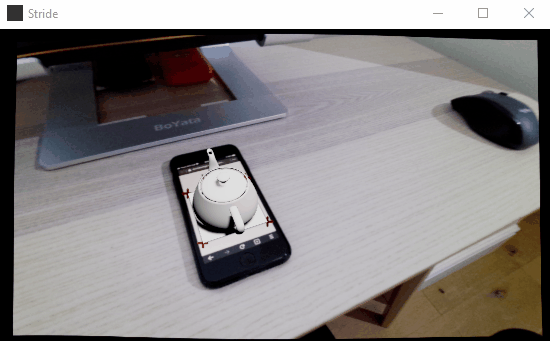
Calibrate a projector
Remember this beauty? It helps you figure out the position and characteristics of your projector in your 3D scene.
And reproject
Once you know where your projector and the spectator are, you only need to worry about the content. 3D projection mapping made easy!

Not bad huh?
So there you have it boys and girls, 3D computer vision based adventures for all! Head to your local nuget distributor and grab a copy while it's still hot.
A big thank you to motzi, gregsn and tebjan for their invaluable help as well as to many others who contributed one way or another.
And as always, please test and report.
Keep your cameras calibrated kids!
Happy holidays!
Changelog
Added Stride compatible versions of
- SolvePnP
- ApplyNearAndFar
- Perspective
- ExtrinsicsToViewMatrix
- ExtrinsicsToProjectionMatrix
New and improved help patches
- Calculate a camera position using Aruco
- Calculate a camera position using SolvePnP
- Estimate the pose of Aruco markers
- Calibrate a projector and reproject
- Calibrate a camera
Bug fixes for
- EstimatePose
- FindChessboardCornersSB
- VideoIn nodes
- VideoPlayer nodes
- CalibrateCamera
- Others
New nodes
- VideoIn nodes with lower level access to device index which enable using previosuly unsupported devices
General cleanup
Improved documentation
Moved beta OpenCV to DX11 transformation nodes to a separate document (\vvvv\nodes\vl\VVVV.OpenCV.vl)
Here is,
another addition to the series of things that took too long. But then they also say that it is never too late... VL was shipping with OSC and TUIO nodes from the beginning, but frankly, they were a bit cumbersome to use. So here is a new take on working with those two ubiquitous protocols:
OSC
Receiving OSC messages
To receive OSC messages you need to place an OSCServer node which you configure to the IP and Port you want to listen on. Immediately it will show you if it is receiving OSC messages at all on the Data Preview output.
Then use OSCReceiver nodes to listen to specific addresses. Either specify the address manually or, hit the "Learn" input to make the node listen to the address of the first OSC message it now receives.
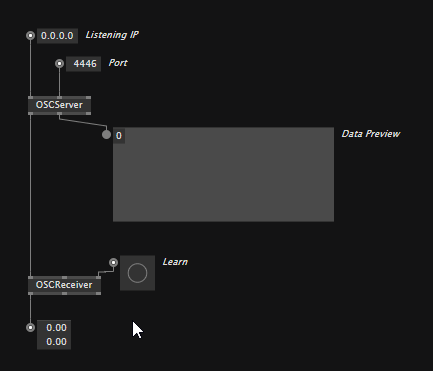
Note, that the OSCReceiver is generic, meaning it'll connect to whatever datatype you want to receive. Supported typetags are:
- i: Integer32, h: Integer64
- f: Float32, d: Float64
- s: String, c: Char
- r: RGBA color
- b: blob byte[]
- T: true, F: false
In case of multiple floats, you can also directly receive them as vectors. And this works on spreads of the above types and even on tuples, in case you're receiving a message consisting of multiple different types.

Sending OSC messages
To send OSC messages you first need an OSCClient which you configure with a ServerIP and Port. Then you're using SendMessage nodes to specify the OSC address and arguments to send. Again note that the "Arguments" input is generic, so you can send any of the above types, spreads of those and even tuples combining different types!
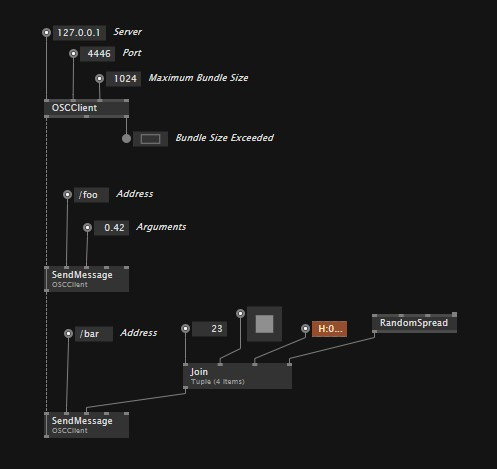
By default, vvvv is collecting all the data you send and sends it out in bundles per frame. For optimal usage of UDP datagram size (depending on your network) you can even specify the maximum bundle size on the OSCClient node.
These are the basics. There are a couple of more things which are demonstrated in the howto patches!
TUIO
Receiving TUIO data
For receiving TUIO data you're using a TUIOClient which you configure to the IP and Port you want to listen on. The client already returns a spread of cursors, objects and blobs that you can readily access.

Sending TUIO data
For sending TUIO data you're using a TUIOTracker node which you configure with a ServerIP and Port. Then you give it a spread of cursors, objects and blobs to send out.
Available for testing now, in latest 2020.3 previews!
Who Natan Sinigaglia / dottore | Kyle McLean / everyoneishappy
When Mon, Dec 14th 2020 - 21:00 until Mon, Dec 14th 2020 - 22:00
Where Online, hosted by the NODE Institute, Germany
Hello vvvvorld!
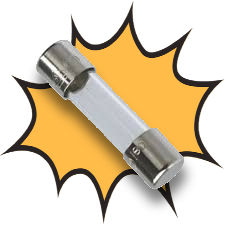
We (Natan Sinigaglia / dottore | Kyle McLean / everyoneishappy) would like to give you a heads up on a project we are undertaking in these times that we would hope should be of some inspiration and enthusiasm for the beloved VVVV community!
The FUSE project will provide a well researched collection of GPU tools and libraries to use with VL.Stride :
- Domain specific high level node collections
○ Distance Fields & Raymarching ○ Particles ○ Procedural Geometry ○ Textures and Materials ○ GPGPU
- A domain agnostic set of nodes and helpers for patching GPU logic
- A clean collection of abstract shader functions that can be easily referenced for coders
Intended to benefit the community and wider ecosystem :
- Free and opensource
- Well documented
- Produced in collaboration with the VVVV group to iterate and improve on the core shader based workflows and approaches of VL.Stride.
We are presenting this project in greater detail on 14th Dec 2020 at 21:00 CET to studios and individuals who are interested in the graphical future of vvvv gamma.
Project Info: vvvv.org/fuse-project
The event is kindly hosted by the NODE Institute.https://thenodeinstitute.org/event/the-fuse-project/
Best regards,
Natan & Kyle
Previously on vvvv: vvvvhat happened in October 2020
November!
A seemingly calm month, but it is boiling under the covvvvers: First, you notice that we continue to update the 2020.2 release with bugfixes. The latest release is vvvv gamma 2020.2.4.
Then, as mentioned previously, we're currently mostly focused on getting a stable 2020.3 out which will include VL.Stride, our shiny new 3d engine. Best of it: you can follow our daily progress by downloading the preview releases. Already comes with tons of help and demo patches. Give it a spin!

If you haven't yet, watch the recording of the last vvvv meetup where, among others, we have texone show us how he already takes VL.Stride to the next level...
And finally done are the completely reworked, easy to use OSC and TUIO nodes which will show up in one of the coming previews soon!
Contributions
Two new ones:
- vl.opencv-camera-calibration-helper by ravazquez
- texture-sharing-from-gamma-to-beta-and-back by bjoern
A little teaser:
And some new works in progress:
- Stateless - the statemachine library by hadasi
- VL.SunCalc by texone
- Elementa "timed" widgets by bjoern
Learning material
Gallery
Jobs
- Always keep an eye on the vvvv job board
- If you need a vvvv specialist or are one yourself, check out this listing of vvvv specialists available for hire
That was it for November. Anything to add? Please do so in the comments!
anonymous user login
Shoutbox
~1d ago
~9d ago
~17d ago
~1mth ago
~1mth ago
~1mth ago
~2mth ago
~2mth ago





